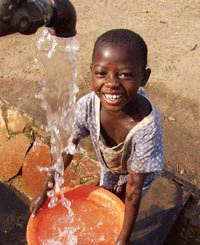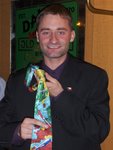
Below is a nice article from chron.com that succinctly explains how it all got started. Hats off to Jin (on right in picture with me) for his vision, and his tenacity to make his vision reality...
The original version is on: http://www.chron.com/disp/story.mpl/outdoors/4811410.html
---
On course toward clean water
Worldwide event slakes man's thirst to lend others hand
By ROBERTA MACINNIS
Copyright 2007 Houston Chronicle
A big 6 a.m. thunderstorm the last Saturday in March washed out a lot of people's regular long runs. It was still raining steadily later that morning when a lone runner passed in front of RMS Auto Care on Westheimer at Woodway as he made his way east along the sidewalk toward downtown.
You wouldn't have given the guy a second glance unless you were looking for him. But he was on a mission. As one runner in a 36-hour, 240-mile relay around the Houston area, he was participating in a dress rehearsal of sorts for the 2007 Blue Planet Run, a round-the-world relay to raise awareness about the global need for safe drinking water.
The event, set for June 1-Sept. 4, was created by Jin Zidell, a California industrialist and philanthropist. In 2002, he established the Blue Planet Run Foundation, a nonprofit organization devoted not only to raising awareness about the problem but also funding clean-water projects in developing countries.
About 1.1 billion people — one-sixth of the world's population — don't have daily access to clean water, and more than 2 million people, mostly children, die annually from water-borne diseases, according to the foundation's Web site.
"How are you going to reach literally tens of millions of people at one time? A run provides a platform to raise awareness," Zidell said.
Zidell, 69, remembers the moment inspiration hit him: 11 a.m. Dec. 17, 2001. He was walking around a lake when he saw a woman running.
"She had the power of a panther and the grace of a gazelle, and she wasn't sitting around thinking of something to do. Just then, I saw the world run," he said.
"Running is the first way we communicated across distances. It's a basic mode of human locomotion. A relay is the reaching out, the passing off, the lifting up, the reaching down."
Zidell got to work enlisting support. Dow Chemical Co. signed on as the primary sponsor. Zidell hired the Atlanta-based firm that stages the Olympic torch relays to handle logistics, which have taken years to organize.
The Houston relay was one of two test runs to make sure the plans would work.
Sixteen Dow employees started at the company's Freeport facility and ran around the clock and the city before ending at a Dow plant in Clear Lake.
"Living here in the United States, I take it for granted that I have access to safe, clean drinking water. I didn't realize how extensive the problem was," said Tom Young, a Dow Chemical employee who lives in Lake Jackson and participated in the Houston relay. Young said he briefly considered applying for the global run, but with two small children, he decided against it.
The 20-person Blue Planet Run team includes 12 men and eight women, ages 23 to 60, representing 13 countries. They were selected from hundreds of applications. The criteria were the ability to run a steady nine-minutes-per-mile pace and to spend more than three months away from home. A commitment to the cause and effective communication skills also were considered.
"They're really messengers. We wanted them to represent 'us,' the global 'we,' " Zidell said.
The runners will be divided into five teams, with each runner averaging 10 miles a day. They will blog about their experiences on the run's Web site — www.blueplanetrun.org — and will be accompanied by a photographer and video crew.
Aside from three days in July, Zidell will travel the entire way with the group, which will pass through such major cities as Boston, London, Moscow, Beijing and Tokyo.
"Running is just one part," Zidell said. "You meet 49 people (the size of the team and crew). You live with them 100 days, in a different bed every night, with every meal in different place. It's a real reality show," Zidell said.
Zidell envisions the Blue Planet Run as a biennial relay, the "third global athletic event" alongside the Olympics and the World Cup.
It's part of his plan to provide safe drinking water to 200 million people for the rest of their lives by 2027; the foundation has bankrolled 130 projects so far.
The problem is big, he pointed out, but one that can be solved cheaply with simple technologies such as rainwater harvesting. A $30 donation, for example, will pay for drinking water for one person for life.
"If we can't win this one, I don't know what we can win," Zidell said.













No comments:
Post a Comment